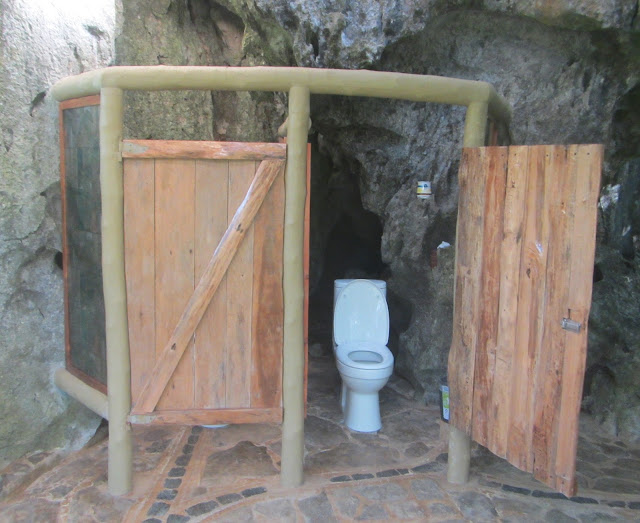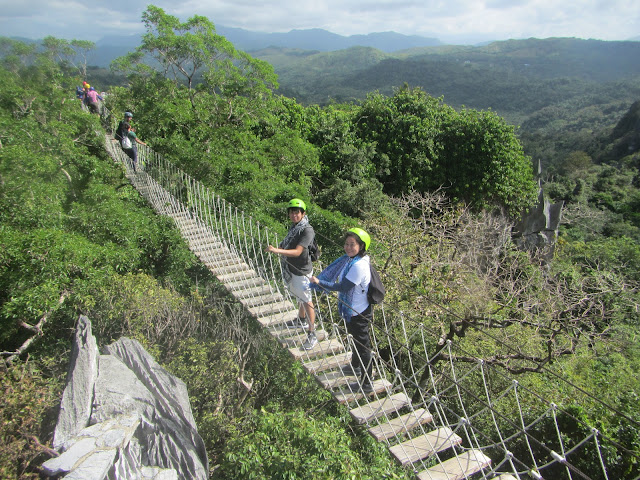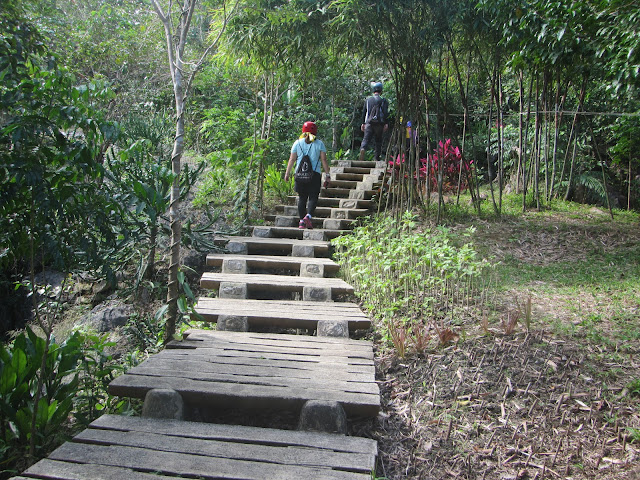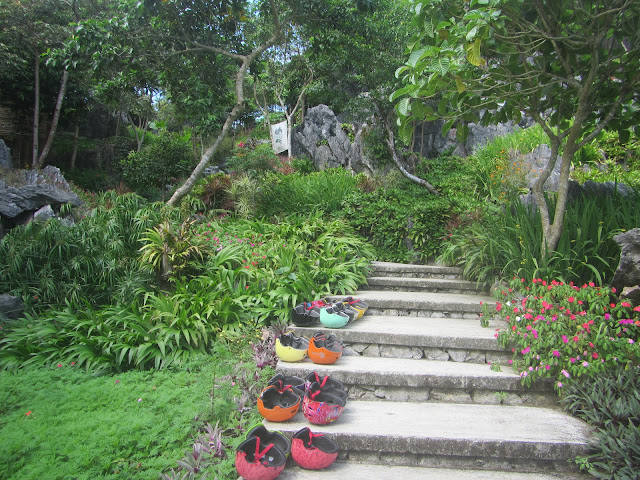Location: Kilometer 47 Marcos Highway, Baras, Rizal, Philippines

Early breakfast on a stopover along the way since we left Manila as early as 5:30 A.M.
This is how the main entrance looks as seen along the highway
The place itself has been developed for over twenty years already to protect the rich biodiversity of the area where more than 400 species of flora and fauna have been documented as the area of their habitat, not to mention that the limestone formations have already aged for around 60 million years and they have to be protected from illegal loggers, quarries and other man-made activities whose intention is to put the area into complete destruction and degradation.
The non-concrete road leading to the georeserve park for a 5-minute walk
Since there are no public vehicles plying to this area, guests who wanted to visit the place should avail of private vehicles. In fact, our group had chartered a van charged to us just to reach the place. At normal traffic condition, it can be reached at 3 to 3.5 hours from Manila International Airport (Ninoy Aquino International Airport) or 1 to 1.25 hours from Quezon City.
The park's location map
Guests are advised to take a heavy breakfast meal since food is not allowed inside and there are no stores selling anything. This is being done to ensure that no garbage will be left by the guests as they tour or navigate the park. Though before exiting, a light snack is being served to include a sandwich and juice out of the organic farm produce of the locals.
The second entrance leading to the natural enclave of the park
You will be enthralled as you gaze on the limestone rock formations right from the second entrance abundantly grown with deep rich green flora species. Concrete stairs will guide you where to go.
Obviously landscaping development has been injected to make it eco-friendly
The park offers packages for activities like: discovery trail, discovery trail at night, legacy trail, dining, company events, group educational tours for schools and weddings.
Look and behold how the place entices our human eyes
The tour package which we availed was the Discovery Trail wherein the trek duration was almost four hours including the orientation, immersing ourselves with the karst terrain of the park. Our group was in a total of 13 as it is the maximum limit of a group. There is no crowding of guests because booking is definitely controlled. With just a few number, every guest will have his/her moment of pictorials.
We were in Silungan where it serves as the receiving and briefing area of guests
It was in Silungan where we had undergone our briefing on the do's and don'ts while inside the sanctuary. It is in this place that we refilled our drinking water for free as food is not really allowed inside.
Silungan as vacated by us after the briefing
After the briefing, we have been given ample time for clean-up and answering the call of nature. Forest rangers had been assigned to us.
The urinal and washing facility inside the comfort room
Seems cool! very clean and eco-friendly
The washing facility on its almost natural form
Fully mesmerized of this naturally enchanting place, we were given time to roam around and completely commune with the charming fauna everywhere and the following pictures are just the proof.
After personal preparations, we started our trek as led by our very accommodating forest rangers whom I believe to be locals. Well, they can communicate well and explained to us every part we pass thru.
Some trails are simply friendly and manageable
and our trek started . . .
then passing through this part . . .
And yes, I preferred to be at the tail so that I capture the trail without photo bombers
another type of trail . . .
Ascending through stone-carved trail
The trail with a rope portion for safety
Of course, to wash our shoes for possible accumulation of clay and dirt
Because we need to go up through net trail with clean shoes
And there I go! I was at the tail and seemed like a sweeper
Passing through a narrow rock opening squeezing in my willing body
My climbing buddies
Going up again in trail-roped portion
Just about to ascend to the next destination
This is "Sapot" - a web-style viewing platform where the spectacular view of Laguna de Bay can be captured - the biggest lake in the Philippines
A group picture at the Sapot viewing platform
The 60 million year old limestones where the Sapot is anchored
And this is how it looks underneath, I went down there
Part of the Sapot limestone support
Other climbing buddies Sir Jun Odonzo and Mam Arleen Bactin strutting this literally hanging and swaying bridge after the Sapot viewing platform
Still part of the swaying hanging wooden trail
Back to the rocky trail
Descending the rocky trail
and a touchdown to this friendly trail
with a few steps away awaits this comforting hammock
Another body squeezing into a narrow rock opening
A gradual descent with concrete trail
White the group is at rest. A swing for four, isn't it exciting?
Moderate ascent led by Dr. Gennie Tagab - my fellow PNB Mountaineering Club member
Another gradual ascent
Another gradual ascent in the a friendlier trail
Sir Jun and Mam Arleen, my Bff on a pensive mode on whether to have a take 5 or proceed
This one opens to a more exciting attraction
Enters at this point
Out into the Ditse and Patak - an air house
With the Patak Air house at the background
Approaching the Patak Air house
What's next is the question
Me being the last to climb thru the net trail
We have to pass through this Duyan trail
As I looked back this is what I have seen
Getting smaller as I did trek away
Climbing up using net trail
Trekking through the Duyan Trail
balancing through the Bayawak Trail
After heights and heights of scaling, we landed down at the dark Yungib ni Ruben
heading to another destination
The "Nanay" peak (second highest) and the "Tatay" peak (the highest)
The entry point to these two peaks
Leading to "Nanay's" peak
And yes! I am already at the highest point
See this? This is the hanging bridge we trailed going back to the briefing area
Heading to the dining area where organic sandwiches and juice were served to us
After having our snacks and refreshments, we went to the wash area for clean up and left. Since, we did it only for almost four hours and it was even before lunch after a sumptuous lunch, our next stop was the Pinto Art Museum in Antipolo. Watch out for the next post.


















































































No comments:
Post a Comment